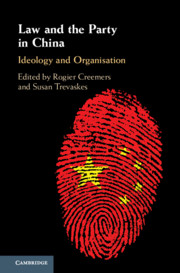Book contents
- Law and the Party in China
- Law and the Party in China
- Copyright page
- Contents
- Contributors
- Abbreviations
- 1 Ideology and Organisation in Chinese Law
- Part I Ideology and the Party in Law
- 2 Party Ideology and Chinese Law
- 3 Making Sense through Ideology
- 4 The Conception of Legality under Xi Jinping
- 5 Law–Morality Ideology in the Xi Jinping Era
- Part II Ideology and the Party in Law and Organisation
- Glossary of Chinese Terms
- Index
- References
5 - Law–Morality Ideology in the Xi Jinping Era
from Part I - Ideology and the Party in Law
Published online by Cambridge University Press: 17 December 2020
- Law and the Party in China
- Law and the Party in China
- Copyright page
- Contents
- Contributors
- Abbreviations
- 1 Ideology and Organisation in Chinese Law
- Part I Ideology and the Party in Law
- 2 Party Ideology and Chinese Law
- 3 Making Sense through Ideology
- 4 The Conception of Legality under Xi Jinping
- 5 Law–Morality Ideology in the Xi Jinping Era
- Part II Ideology and the Party in Law and Organisation
- Glossary of Chinese Terms
- Index
- References
Summary
This chapter examines key assertions about the nature of law and morality under the Xi Jinping administration, identifying that these assertions have been to frame and embed the Chinese Communist Party leadership’s ambitions ‘to lead over everything’ through greater supervision and discipline, including promoting morality-based ‘self-discipline’. In doing so, this chapter firstly looks at the rule of law discourse in the Xi era: how it has come to describe not only state law but also Party rules and modes of governance, including ‘governing the country by moral virtue’. This chapter then identifies how the current discourse has reignited the ideological import of morality from the Mao era and imperial political ideas to affirm the Party’s contemporary moral supremacy to ‘govern the nation according to law’ through socialist core values. Thus in China today, a particular brand of socialist morality is integrated into the overall legal–political mix to shape and justify the ideology of law–morality amalgam being instrumental to the Party’s ambition to bring about a rejuvenated and spiritually civilised well-off society.
Keywords
- Type
- Chapter
- Information
- Law and the Party in ChinaIdeology and Organisation, pp. 121 - 148Publisher: Cambridge University PressPrint publication year: 2021
References
- 1
- Cited by

